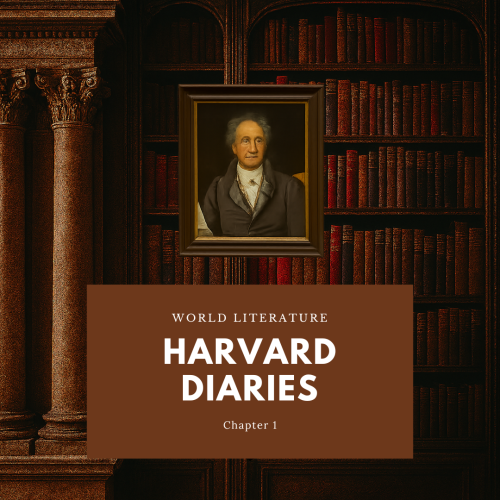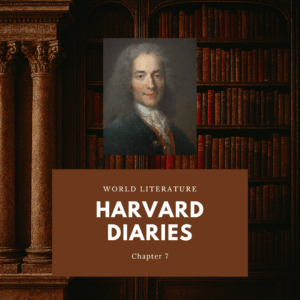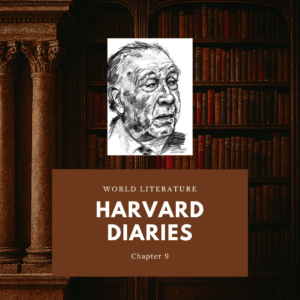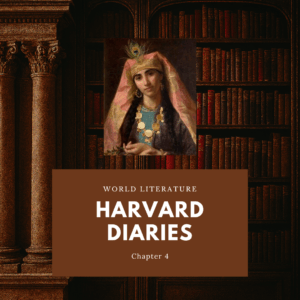
Harvard diaries: Goethe, Eckermann and the global imagination
chapter 1
This week’s course material does not include a mandatory reading assignment. Instead, it offers a series of short lectures in which professor Martin Puchner explores the intellectual atmosphere, historical conditions, and cultural impact surrounding the emergence of the term world literature. He examines how the concept was born, how it was documented, and why its historical significance was not immediately recognized or embraced by Goethe’s contemporaries.
The lectures guide students from the half of the 18th century into the early decades of the 19th century. Professor Puchner travels to Weimar and introduces the central figures of this weeks study: Johann Wolfgang von Goethe and Johan Peter Eckermann. Through their life circumstances and personal choices, we begin to understand how the foundations of world literature were laid.
Goethe’s Engagement with Oriental Thought
Goethe (1749-1832), a towering figure of German intellectual life, was a visionary writer, reader, and statesman whose worldview far exceeded that of his peers. He is presented in his home in Weimar, the city where he spent the most significant moments of his life – writing, working, and ultimately living out his final years. Weimar became epicenter of his creative and philosophical pursuits.
Goethe’s passion for reading and writing was fueled by a deep yearning to engage with the wider world. His decision to travel to Italy in 1786 marked a turning point in his literary career. Inspired by classical antiquity and cultural richness of the Mediterranean, he inaugurated a new literary phase known as Weimar Classicism (1786-1895). During his period he reimagined his literary style in light of his travels and exposure to other traditions. It also laid the groundwork for his later reflections on global literature. Upon returning from Italy, he composed the Roman Elegies (1788-1790), celebrating sensuality, art, and cultural exchange.
Later in life, Goethe was profoundly moved by the Persian poet Hafez. Not only did he read Hafez’s works, but he responded with an entire poetic collection –West-östlicher Divan (1814–1819) – a literary dialogue across centuries and cultures. In this collection Goethe explored the relationship between East and West, blending Islamic, Persian, and European traditions. His fascination led him to study Arabic so he could read texts in their original language.
Goethe’s interest in Islamic and Arabic literature was seen as eccentric by many of his peers. On one of his birthdays, a friend sen him a turban as a half-mocking gift, poking fun at his ”oriental obsession”. But Goethe took no offense. Instead, he embraced the symbolism, turning mockery into poetic reflection.
Eckermann and the moment of world literature
Johann Peter Eckermann (1792-1854), a German poet and author, is best known for his work Conversations with Goethe, the result his close association with Goethe during the final years of the elder’s life.
Thanks to Eckermann’s notes, the birth of world literature is documented on 31 January 1827, in Goethe’s house. It was a Wednesday. During their conversation, Goethe revealed that he had been reading Chinese novels. This provoked skepticism. Eckermann questioned whether such works were worthy of attention at all.
Goethe responded patiently. He began by recalling the influence of the British novelist Samuel Richardson on his own development, then emphasized that the Chinese had been writing novels long before Europeans had even begun to conceive of such forms. Reading Chinese literature, he insisted, was not indulgence – it was necessity.
”For only through the voices of others,” Goethe said, ”can we truly hear our own.”
He urged that we must approach the works not as foreigners peering in, but as equals reaching out. As citizens of the world, we must hasten the arrival of a new literary epoch – one that transcends borders and traditions. He called it Weltliteratur – world literature.
This was the moment world literature was born.
Study pace reflection
This week’s study pace was quite manageable. Since no assigned reading was included, the reading portion didn’t take much time. The lecture videos covering various subtopics were short and concise – altogether totaling around 20-30min.
At the end of the chapter, there was a text-based quiz consisting of 20 relatively easy questions. Answering them took no more than 25 minutes. One thing I noticed was that lectures lacked some historical precision – for example, exact dates of Goethe’s travels or publication years were missing. Additionally, the narrative structure occasionally presented older historical events after new ones, which made the timeline a bit confusing. I ended up doing some extra research to clarify the chronological order of events for this text. That said, this was more a matter of personal curiosity and taste than necessity.
In conclusion, this week felt easy, pleasant, and surprisingly inspiring. The material sparked curiosity and left me with a sense of endless intellectual exploration.



